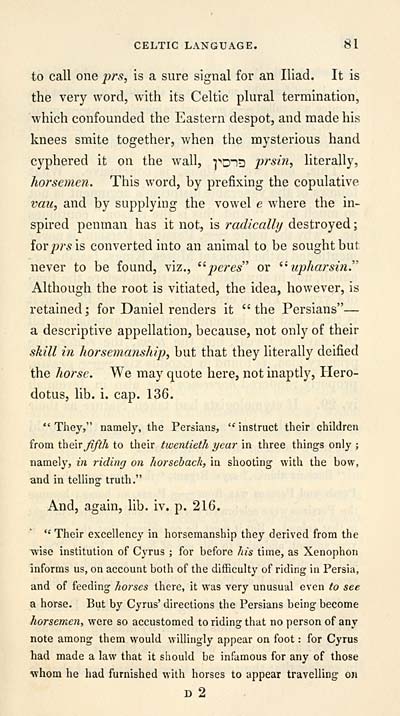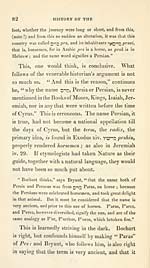Download files
Complete book:
Individual page:
Thumbnail gallery: Grid view | List view

CELTIC LANGUAGE. 81
to call one prs, is a sure signal for an Iliad. It is
the very word, with its Celtic plural termination,
which confounded the Eastern despot, and made his
knees smite together, when the mysterious hand
cyphered it on the wall, "|>o-i2 prsin, literally,
horsemen. This word, by prefixing the copulative
vau, and by supplying the vowel e where the in-
spired penman has it not, is radically destroyed ;
for/>;-5is converted into an animal to be sought but
never to be found, viz., '■'■peres" or ^' upharsin.''
Although the root is vitiated, the idea, however, is
retained; for Daniel renders it "the Persians" —
a descriptive appellation, because, not only of their
skill in horsemanship^ but that they literally deified
the horse. We may quote here, not inaptly, Hero-
dotus, lib. i. cap. 136.
" They," namely, the Persians, " instruct their children
from ihe\r fifth to their twentieth year in three things only ;
namely, in riding on horseback, in shooting with the bow,
and in telling truth."
And, again, lib. iv. p. 216.
" Their excellency in horsemanship they derived from the
wise institution of Cyrus ; for before his time, as Xenophon
informs us, on account both of the difficulty of riding in Persia,
and of feeding horses there, it was very unusual even to see
a horse. But by Cyrus' directions the Persians being become
horsemen, were so accustomed to riding that no person of any
note among them would willingly appear on foot : for Cyrus
had made a law that it should be infamous for any of those
whom he had furnished with horses to appear travelling on
D 2
to call one prs, is a sure signal for an Iliad. It is
the very word, with its Celtic plural termination,
which confounded the Eastern despot, and made his
knees smite together, when the mysterious hand
cyphered it on the wall, "|>o-i2 prsin, literally,
horsemen. This word, by prefixing the copulative
vau, and by supplying the vowel e where the in-
spired penman has it not, is radically destroyed ;
for/>;-5is converted into an animal to be sought but
never to be found, viz., '■'■peres" or ^' upharsin.''
Although the root is vitiated, the idea, however, is
retained; for Daniel renders it "the Persians" —
a descriptive appellation, because, not only of their
skill in horsemanship^ but that they literally deified
the horse. We may quote here, not inaptly, Hero-
dotus, lib. i. cap. 136.
" They," namely, the Persians, " instruct their children
from ihe\r fifth to their twentieth year in three things only ;
namely, in riding on horseback, in shooting with the bow,
and in telling truth."
And, again, lib. iv. p. 216.
" Their excellency in horsemanship they derived from the
wise institution of Cyrus ; for before his time, as Xenophon
informs us, on account both of the difficulty of riding in Persia,
and of feeding horses there, it was very unusual even to see
a horse. But by Cyrus' directions the Persians being become
horsemen, were so accustomed to riding that no person of any
note among them would willingly appear on foot : for Cyrus
had made a law that it should be infamous for any of those
whom he had furnished with horses to appear travelling on
D 2
Set display mode to: Large image | Transcription
Images and transcriptions on this page, including medium image downloads, may be used under the Creative Commons Attribution 4.0 International Licence unless otherwise stated. ![]()
| Early Gaelic Book Collections > Blair Collection > History of the Celtic language > (87) |
|---|
| Permanent URL | https://digital.nls.uk/76179566 |
|---|
| Description | A selection of books from a collection of more than 500 titles, mostly on religious and literary topics. Also includes some material dealing with other Celtic languages and societies. Collection created towards the end of the 19th century by Lady Evelyn Stewart Murray. |
|---|
| Description | Selected items from five 'Special and Named Printed Collections'. Includes books in Gaelic and other Celtic languages, works about the Gaels, their languages, literature, culture and history. |
|---|

